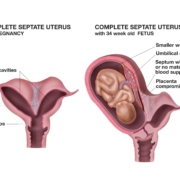FALSE PREGNANCY (Pseudocyesis)
What is a False Pregnancy?
In this, women experience more pronounced symptoms of pregnancy including missed periods, a growing abdomen, and even baby kicks. False pregnancy is not only common in women, but men also experience it at times. They develop similar pregnancy symptoms like their partner, including weight gain, nausea, and backache, which is referred to as couvade or sympathetic pregnancy. But this isn’t related to a miscarriage. In a false pregnancy, there was no conception and there is no baby. Despite this, symptoms can last long enough to make a woman, and even those around her, believe she’s expecting.
In simple terms, pseudocyesis or false pregnancy is believing that you are pregnant when in reality you are not carrying a child. Pseudocyesis is the medical term for a false pregnancy or what some people refer to as a phantom pregnancy. People with pseudocyesis have many, if not all, symptoms of pregnancy, with the exception of an actual fetus.
A woman’s intuition is a funny thing. Most women know they are pregnant before they are even far enough along to take a test.
How Common Is Pseudocyesis?
In the general population, pseudocyesis occurs in about 1-6 out of every 22,000 births. Most instances of pseudocyesis occur in women of childbearing ages, between the ages of 20-44 years. Rarely, men experience “sympathetic pregnancy,” known as pseudocyesis. You can experience pseudocyesis more than once in your life.
What Causes False Pregnancy?
Pseudocyesis is extremely rare in both men and women and just recently doctors have begun to understand the psychological and physical root of pseudocyesis. Although the exact causes still aren’t known, doctors suspect the cause comes from trauma, either a physical or mental trauma, while others believe it is a chemical imbalance. In some cases, there are other medical conditions that may cause pregnancy symptoms to be experienced.
Here are some of the reasons a person might experience symptoms of pseudocyesis:
- An intense desire to get pregnant after miscarriage or impending menopause and hormonal imbalance which causes pregnancy symptoms to appear.
- Abdominal distention from other physical factors such as weight gain, gas, or tumors, in combination with psychological delusions of pregnancy, may cause a woman to believe she is pregnant
- Other physical and hormonal factors such as pituitary tumors or ovarian/uterine cysts or growths along with a desire to become pregnant.
- The woman’s brain then misinterprets those signals as pregnancy, and triggers the release of hormones (such as estrogen and prolactin) that lead to actual pregnancy symptoms.
Symptoms
- Enlarged and tender breasts, changes in the nipples, and possibly milk production
- Interruption of the menstrual period
- Weight gain
- Morning sickness and vomiting
- Reduced appetite
Tests for False Pregnancy
Ultimately, the only way to know for sure if someone is experiencing pseudocyesis is to administer a pregnancy test or ultrasound. The most definitive test to check for pregnancy would be an ultrasound that checks for the presence or absence of a developing fetus. In a case of false pregnancy, your health professionals will not see any baby in the ultrasound, and there won’t be any heartbeat.
If the absence of pregnancy is confirmed, but concerning physical symptoms linger, another testing might be administered to rule out other medical issues, such as hormonal imbalances or tumor growth. Certain medical conditions can mimic the symptoms of pregnancy, including ectopic pregnancy, morbid obesity, and cancer. health professionals conduct further tests to rule out these.
Treating False Pregnancy
Pregnancy, whether true or false, is an exciting time for an expectant mother. When women believe they are pregnant, especially for a period of several months, it can be very upsetting for them to learn that they are not. The grief that comes next may be intense. In this case, they may need to be under the care of a psychiatrist or psychologist. In some cases, psychotropic drugs, in combination with psychotherapy, may be helpful.
Bottom line
It’s important to understand that pseudocyesis is a very complex issue. If you are caring for a loved one who has experienced pseudocyesis, it’s important to be gentle. Very often, pseudocyesis stems from the trauma of having lost a pregnancy or having experienced infertility.
Pseudocyesis is treatable and can be resolved, but it may be painful for the person who is experiencing it as well as their loved ones. So be kind and also encourage your loved one to seek professional help when the situation warrants it. Most of all, remember that you are not alone, and with proper care, you will feel like yourself again before you know it.
Disclaimer
The information, including but not limited to, text, graphics, images and other material contained on this website are for informational purposes only. The purpose of this website is to promote broad consumer understanding and knowledge of various health topics. It is not a substitute for professional medical advice, diagnosis, or treatment. Always seek the advice of your physician or another qualified healthcare provider with any questions you may have regarding a medical condition or treatment and before undertaking a new health care regimen, and never disregard professional medical advice or delay in seeking it because of something you have read on this website.
References:
https://www.webmd.com/baby/false-pregnancy-pseudocyesis#1 https://americanpregnancy.org/getting-pregnant/false-pregnancy/
https://www.healthline.com/health/pregnancy/phantom-pregnancy












Leave a Reply
Want to join the discussion?Feel free to contribute!